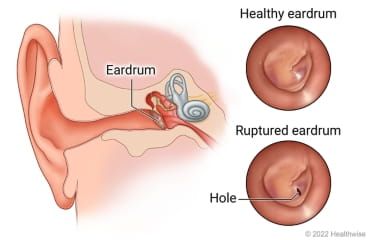 Damage to your ear can cause not only hearing problems but also issues with your balance. The inner ear is home to the vestibular system, which controls your balance.
Damage to your ear can cause not only hearing problems but also issues with your balance. The inner ear is home to the vestibular system, which controls your balance.
A ruptured eardrum is one common way your ear can become damaged. This occurs when the thin tissue between the ear canal and middle ear tears. The thin tissue is also known as the tympanic membrane.
A hole or perforation in your eardrum can be painful and produce unpleasant symptoms. The ear, nose and throat (ENT) experts at The Ohio State University Wexner Medical Center provide leading care to help repair damaged ears. Our specialists are experts in many types of ear conditions, and other physicians in central Ohio and throughout the region often refer their patients to our leading neurotologists and ear specialists for this more advanced care.
What is a ruptured eardrum?
A tear or hole in the tympanic membrane is called a perforated or ruptured eardrum. The tympanic membrane separates the middle ear from the outer ear and vibrates when sound reaches it.
The membrane is thin but provides vital protection for the middle and inner ear, so ensuring that it heals properly is very important.
How serious is a ruptured eardrum?
A small ruptured eardrum should heal itself in a few weeks to months, but it can cause hearing loss and leave the middle ear vulnerable to infections if it doesn’t. Sometimes a surgery called a tympanoplasty is required to patch the hole in the membrane.
Causes of a ruptured eardrum
There are various reasons for an eardrum to tear, with some of them preventable and others not. Causes of a ruptured tympanic membrane include:
- Middle ear infections – Also called otitis media, these ear infections can cause fluid buildup that puts pressure on the eardrum, leading to a rupture.
- Foreign objects – Any object that is put too far into the ear has the potential to poke a hole in the eardrum.
- Barotrauma – This happens when the air pressure inside the middle ear and the pressure outside in the environment are out of balance. Sudden changes in air pressure associated with air travel or scuba diving can be severe enough to perforate the eardrum.
- Exposure to loud noises (acoustic trauma) – Your eardrum could rupture if you’re near explosive sounds, like gunfire or blasts.
- Head trauma – Severe injuries like skull-base fractures could cause the eardrum to tear, as could major blows to the ear area.
Perforated eardrum symptoms
You might feel a pop in your ear when the eardrum ruptures. Symptoms that follow can include:
- Sudden pain
- Hearing loss or muffled hearing
- Drainage or bleeding from the ear
- Tinnitus (ringing or buzzing in the ear)
- Vertigo or dizziness
Treatment for a ruptured eardrum
A small rupture of the eardrum should heal by itself and then hearing should return to normal. While you wait for it to heal, you can take over-the-counter medications for pain. You should keep your ear dry and not exposed to water at all times. If an infection occurs, your doctor might prescribe antibiotics.
If the hole or tear doesn’t repair itself over time, we might recommend medical interventions. These include:
- An eardrum patch: For this in-office procedure, we’ll place a small patch made of paper or other material over the hole to promote healing and protect the middle ear.
- Tympanoplasty – During this surgical procedure, which requires general anesthetic, we’ll use tissue from another part of your body to graft over the perforated eardrum.
How long does it take for a perforated eardrum to heal?
On its own, a ruptured eardrum should heal in a few weeks to months; however, if you require surgery, recovery could last several weeks following the procedure.
How to care for a ruptured eardrum at home
While your ear is healing, there are certain steps you can take at home to prevent infection and increase the chance of the damage repairing itself without major surgery. Those steps include:
- Keep your ears dry by using earplugs or placing a cotton ball in the ear while showering.
- Avoid swimming until the ear has healed.
- Use a warm compress or heating pad to relieve pain.
- Refrain from cleaning your ears or putting any foreign objects in the ears.
- Avoid blowing your nose as much as possible.
Patient Forms
Additional Information
How would you like to schedule?
Don’t have MyChart? Create an account
